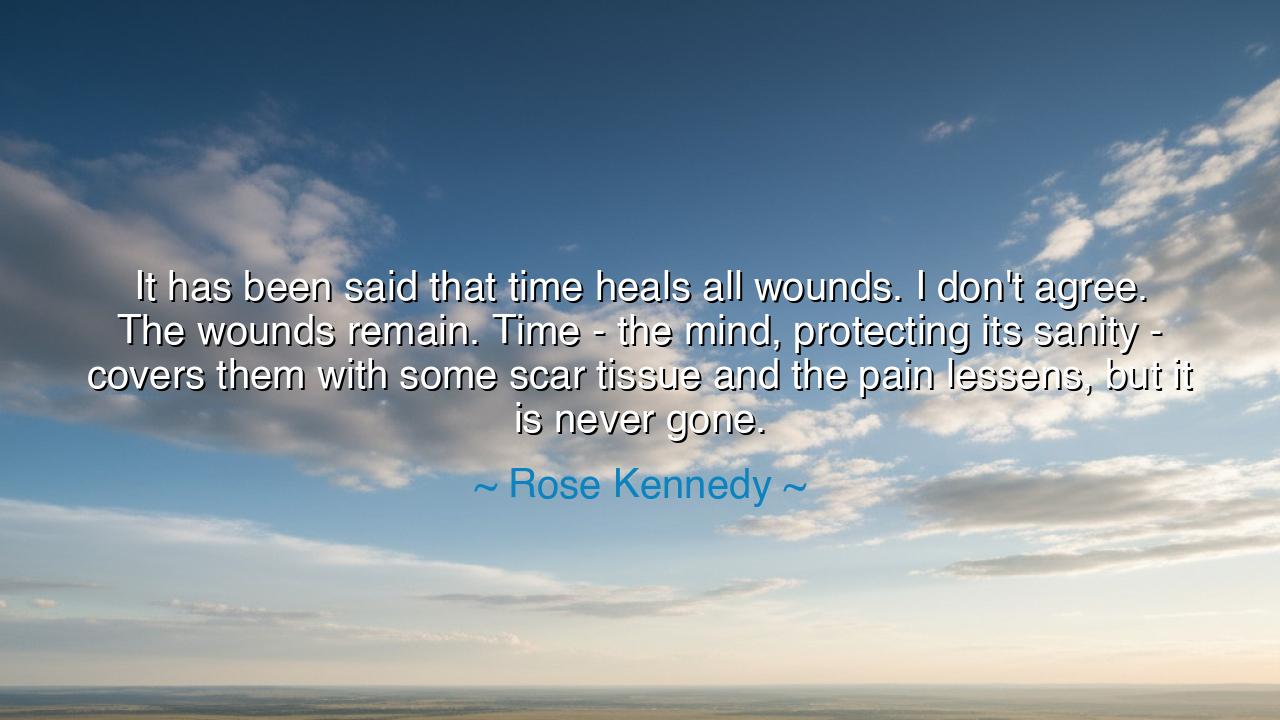
It has been said that time heals all wounds. I don't agree. The
It has been said that time heals all wounds. I don't agree. The wounds remain. Time - the mind, protecting its sanity - covers them with some scar tissue and the pain lessens, but it is never gone.






The words of Rose Kennedy, matriarch of a house that knew both splendor and sorrow, fall upon us like a solemn bell: “It has been said that time heals all wounds. I don't agree. The wounds remain. Time—the mind, protecting its sanity—covers them with some scar tissue and the pain lessens, but it is never gone.” These words are not born from idle philosophy, but from a heart carved by grief. For she, who bore nine children, also bore the heavy toll of burying many of them. From the assassination of John F. Kennedy to the loss of Robert Kennedy, and the struggles of her children marked by tragedy, she knew pain not as theory but as constant companion.
The ancients too wrestled with this truth. The poets sang of wounds that never closed. Achilles, though mighty in battle, carried the unhealed scar of Patroclus’ death until it drove him to vengeance. The Romans, who gloried in conquest, still kept funeral masks of their dead ancestors to remember that loss is eternal. And the Hebrews, in their psalms, cried out that sorrow endures through the night, though morning brings new strength. Thus, Rose Kennedy’s lament joins an unbroken chorus of those who understood that grief does not vanish—it transforms.
For what is a scar but the body’s memory made flesh? It testifies both to the wound endured and the survival achieved. The same is true of the soul. Time may lay coverings upon sorrow so that we may walk, laugh, and labor again, yet beneath those coverings the mark remains. This is no weakness, but truth: the past lives within us, etched into our being, shaping our gaze upon the world. To deny this is to deny our humanity.
History itself offers witness. Consider the survivors of Hiroshima, who walked amid ash and ruin. Though decades passed, their bodies bore scars, their hearts bore memories, and their voices, when lifted, declared not that time had erased their agony, but that they had learned to live with it. The wound endured, but so too did courage. Their lives were not free of pain, but they stood as testimony that out of scars may come wisdom, and out of loss may come compassion.
So too in our personal lives: we each carry wounds. Some are small and fade quickly, others vast and unfathomable. Do not be deceived by those who say, “You will forget, for time heals all.” The truth, as Rose Kennedy knew, is harder but more profound: we never forget, but we learn to endure. And in this endurance, we become deeper, more tender toward the sufferings of others, more grateful for the fragile joys that remain.
Therefore, the lesson is thus: do not demand of yourself the impossible—that pain should vanish. Instead, allow yourself to grow around it, as a tree grows around a stone in its trunk. Let the scar become part of your strength, not your prison. Do not be ashamed of tears, for they water the roots of compassion. Do not despise your scars, for they mark the places where you were broken and yet survived.
In practice, nurture your heart as one tends a garden after fire. Speak honestly of your grief with those you trust. Honor the memory of what you lost, not by trying to erase it, but by carrying it with dignity. And when you see another bowed beneath invisible weight, remember your own scars and extend to them kindness instead of judgment. For in this shared acknowledgment of enduring wounds, we bind ourselves together as one human family.
And so, hear the wisdom of Rose Kennedy: time does not erase, but it teaches us to endure. Let us not flee from our scars, but embrace them as part of the story we carry into the future. For though the wounds remain, we remain also—and in our endurance, there is both strength and beauty eternal.






AAdministratorAdministrator
Welcome, honored guests. Please leave a comment, we will respond soon